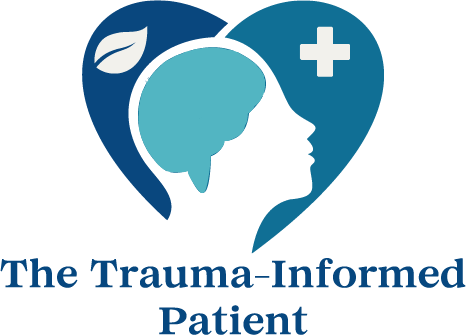Medical Trauma
Factors
How is medical trauma different from othertypes of trauma?
The Enduring Somatic Threat Model, developed by Donald Edmondson, explains that while most traumas are connected to past events, medical trauma is different because the fear of death, pain, or illness stays within the body.
To address and avoid future health complications, ongoing treatment is often necessary. However, this continuous treatment can sometimes make the trauma worse and can lead to increased symptoms of traumatic stress, such as intense anxiety, high heart rate, and avoidance of medical care.
These symptoms can even result in the development of new health problems or the exacerbation of existing conditions.

In Healthcare Settings
Medical trauma happens within healthcare systems, involving interactions with providers, procedures, hospital stays, and healthcare places, leading to unique stresses and power dynamics.
Not by Choice
Medical trauma often involves situations where individuals have little control, like emergency procedures, surgeries, or treatments, making them feel powerless or distressed.
Trust in Healthcare
Medical trauma can affect trust in providers, treatment plans, and healthcare systems, especially after negative experiences or errors.
Physical Effects
Medical trauma is closely linked to physical health concerns, treatments, and interventions that directly impact a person’s well-being and healing process.
Navigating the System
Dealing with medical trauma means navigating the complicated healthcare systems, treatments, insurance processes, and follow-up care, which can be overwhelming, especially when coping with stress.
Invasive Experiences
Medical trauma often includes invasive procedures, surgeries, or treatments that can deeply impact a person’s emotions and sense of personal boundaries.
Facing Illness and Mortality
Medical trauma can bring individuals face-to-face with issues of sickness, physical pain, and fear of death more directly than other traumas, triggering deep-seated anxieties and emotional challenges.

Medical Gaslighting
Some people may have heard the term “medical gaslighting”. What does this mean?
Medical gaslighting happens when healthcare providers don’t take a patient’s symptoms or concerns seriously. They might ignore, downplay, or twist the patient’s words, making them doubt their experiences.
can be harmful, leading to a lack of trust in providers, delays in getting the proper care, and worse health outcomes.
Healthcare professionals must listen to patients, believe them, and communicate openly to build trust and provide better care.
This can be another form of trauma in a healthcare setting.
Trauma Informed Care
One way of preventing and helping to heal medical trauma is by providing care in a trauma-informed manner. What does trauma-informed care mean?
Trauma-informed care in healthcare acknowledges how trauma can deeply affect a person’s physical, emotional, and mental well-being.
It involves creating a safe and supportive environment that considers the individual needs of those who have faced trauma. Key aspects of trauma-informed care include:
- Safety
- Peer Support
- Trustworthiness & Transparency
- Collaboration and Empowerment
- Cultural Humility
- Trauma Awareness
- Resilience and Recovery

Colleen Lee
Colleen Lee, PMHNP-BC
The Trauma-Informed Patient
Founder
Safety
Providing a secure, calm environment free of triggers that could retrigger past trauma.
Peer Support
Connecting individuals with similar experiences to create a supportive community.
Trustworthiness & Transparency
Building trust through honest communication, respecting boundaries, maintaining confidentiality, and involving patients in their care decisions.
Collaboration and Empowerment
Encouraging patients to actively participate in their care, respecting their choices, and promoting empowerment.
Cultural Humility
Valuing and understanding the diversity of patients and how historical and societal factors can impact their trauma experiences.
Trauma Awareness
Educating healthcare providers on trauma's prevalence and effects, recognizing trauma symptoms and responses, and using sensitive approaches with trauma survivors.
Resilience and Recovery
Focusing on individuals' strengths, resilience, and potential for healing and supporting their journey towards recovery in a positive, strength-based manner.
Resilience Factors
Resilience factors are something we all have, and focusing on these plays a crucial role in helping individuals cope with and recover from medical trauma. What is resiliency?
Resilience is the ability to recover and adapt from tough situations, stress, or trauma. In the context of medical trauma, certain factors can help individuals bounce back and cope with emotional challenges.
These factors protect against the harmful effects of trauma and aid in long-term recovery. Here are key resilience factors in the context of medical trauma.
Social Support
A strong network of family, friends, colleagues, or support groups offers emotional validation and practical help, fostering resilience during medical trauma.
Positive Coping Skills
Effective coping strategies like problem-solving, emotional control, mindfulness, and stress management aid individuals in handling emotional impacts from medical trauma, reinforcing resilience.
Self-Efficacy
Believing in one’s ability to face challenges, make decisions, and handle tough situations enhances resilience in medical trauma, fostering a sense of control and strength.
Adaptive Thinking
Developing positive thinking patterns, finding meaning in adversity, and cultivating hope and optimism enhance resilience and emotional well-being post-medical trauma.
Emotional Regulation
Practicing skills like: mindfulness, relaxation techniques, and expressing emotions help manage distress and anxiety related to medical experiences and build resilience.
Professional Support
Seeking mental health services, therapy, or trauma-informed care from healthcare providers aids in processing trauma, addressing emotional hurdles, and fostering resilience post-medical trauma.
Physical Well-Being
Prioritizing physical health through exercise, nutrition, sleep, and self-care supports overall well-being, enhancing resilience during medical trauma.
Spiritual or Cultural Support
Finding comfort and strength in spiritual beliefs, cultural practices, or traditions can help individuals cope with the emotional impact of medical trauma.
Key reasons why tackling medical trauma is essential
Recognizing, treating, and preventing medical trauma is important for several reasons because it can greatly impact patients’ physical and emotional well-being, their healthcare experiences, and overall health outcomes. Here are key reasons why tackling medical trauma is essential:
Patient Safety
Neglecting medical trauma can lead to patients distrusting healthcare providers, avoiding medical care, and not following treatment plans, potentially compromising their safety and health results.
Quality of Care
Medical trauma can affect the quality of care patients receive by causing distress, fear, and anxiety that interfere with communication, treatment adherence, and the patient-healthcare provider relationship.
Patient Satisfaction
Patients who have gone through medical trauma might hold negative views of healthcare environments, providers, or procedures, which can impact their satisfaction with care. Addressing trauma can enhance patient satisfaction and trust in healthcare.
Physical Health
The psychological impacts of medical trauma, like anxiety and stress, can influence physical health outcomes, leading to conditions such as chronic pain, heart issues, and weakened immune function.
Mental Health
Untreated medical trauma can result in mental health issues like anxiety disorders, depression, PTSD, and other psychological conditions that affect mental well-being and quality of life.
Recovery and Healing
Dealing with medical trauma is crucial to help patients in their recovery and healing, aiding in emotional processing, coping strategies, and resilience during traumatic medical events.
Patient Empowerment
By addressing medical trauma, healthcare providers empower patients to voice their needs and concerns and actively engage in their care decisions, promoting patient-centered and trauma-informed healthcare approaches.
Prevention of Retraumatization
Handling medical trauma helps prevent patients from being retraumatized in healthcare settings, fostering safe and supportive environments that prioritize respect, dignity, and compassionate care.
